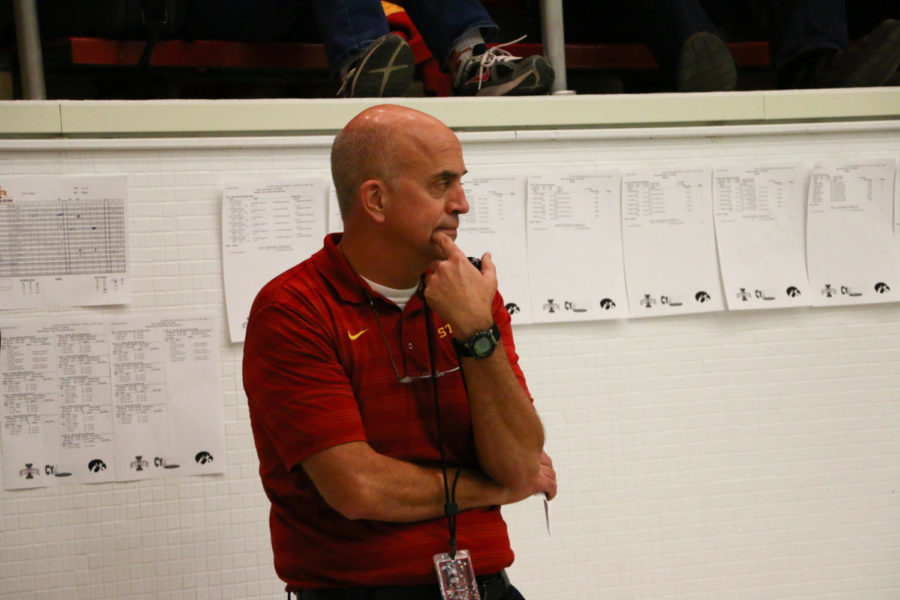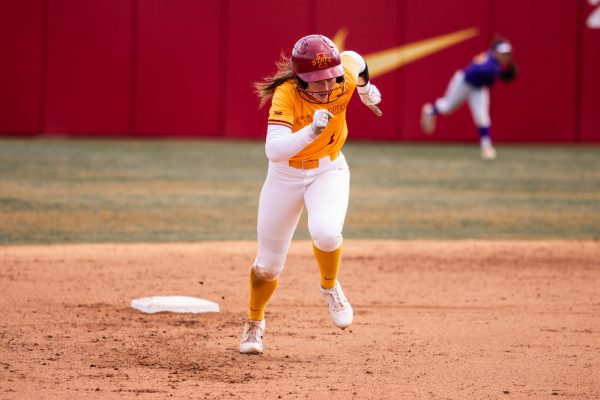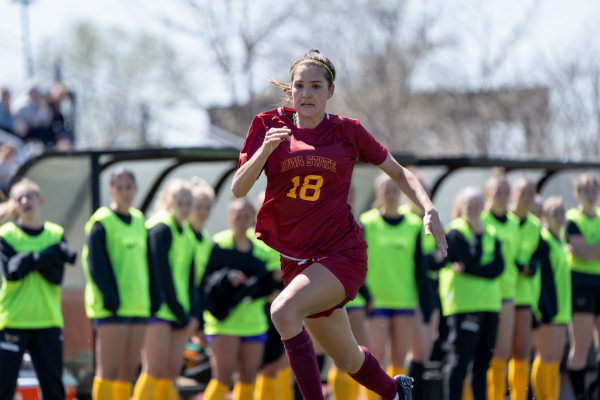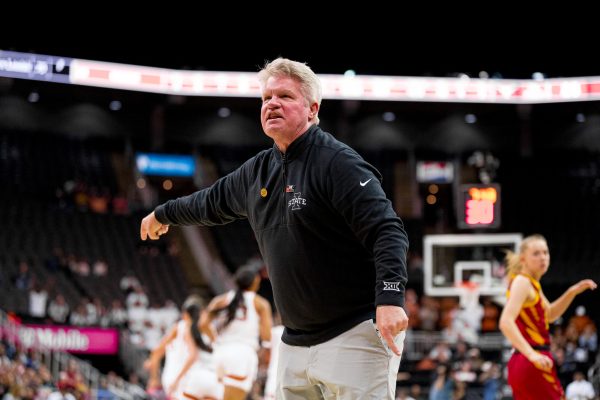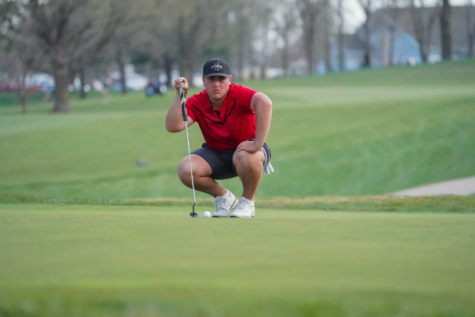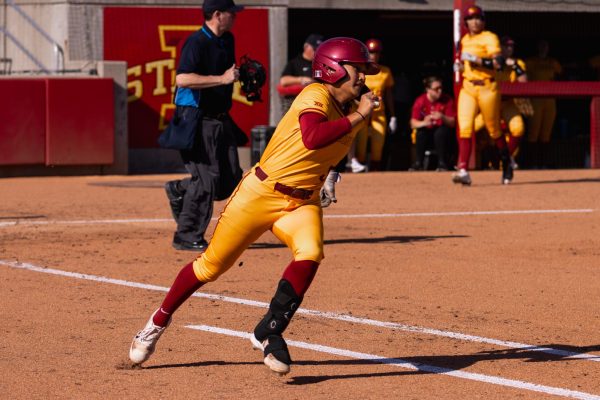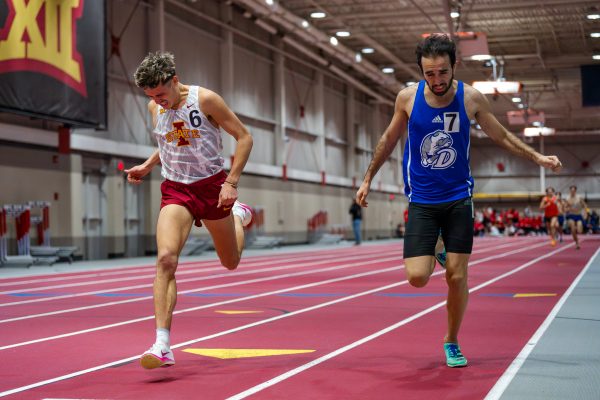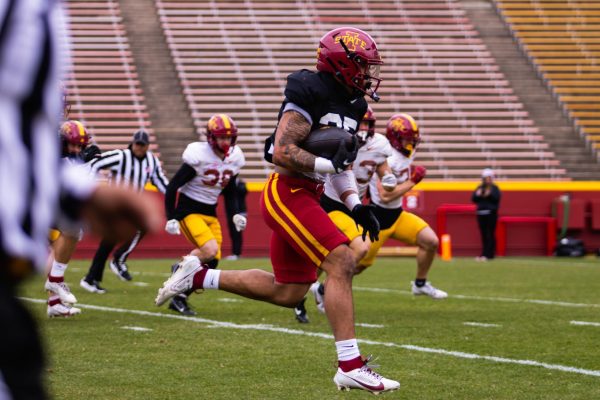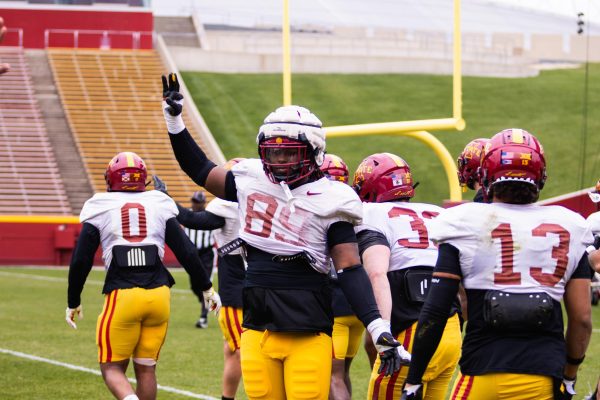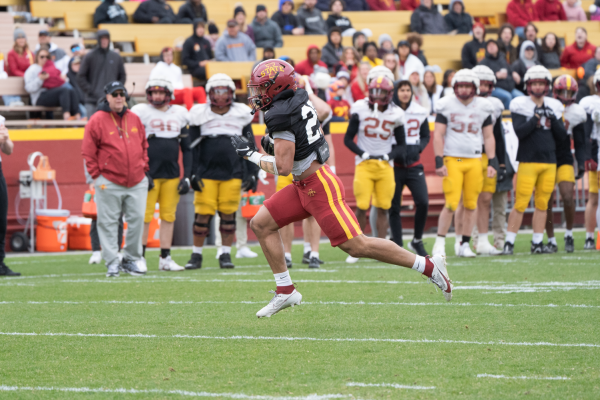A coach’s impact: How Duane Sorenson goes above and beyond for his athletes
April 21, 2020
Duane Sorenson, head coach of the Iowa State women’s swim and dive team, knew from about the time he was in middle school that he wanted to be a coach.
In college, he was a physical education major and had it tailor-made to teach him to be a professional coach.
His college teammate and eventual Iowa State men’s swim and dive coach, Trip Hedrick, said he knew Sorenson would be a great coach because of how knowledgeable, technical and engaged in the sport he was.
“It was like having a coach for a teammate,” Hedrick said. “Duane was a coach even when he was swimming.”
Despite this, Sorenson didn’t always want to be a swimmer. He did other sports. Sorenson tried football, but he said he wasn’t that athletic as a young person. He also ran cross country and gave baseball a go too, but when he tried swimming, Sorenson said it was like a natural fit.
“Swimming was my niche,” Sorenson said.
Until he got to high school, there were no swimming pools around, so Sorenson learned how to swim in the St. Croix River in Minnesota. Sorenson said he would go to open swim at the high school and that training was totally different from what it is today.
Sorenson said he had a great high school coach and his college coach at Bemidji State University, Lee Ahlbrecht, was a great mentor and taught him a lot — a sentiment echoed by Hedrick.
“Lee was a legendary coach,” Hedrick said. “A perfect role model to go into coaching, he was the reason we went into coaching.”
With such a great coach to look up to, it’s no surprise Sorenson has turned into the respected coach he is today. Sorenson started his coaching career in Minnesota, when a club team that he grew up with asked him to coach right away. He went on to be head coach at Woodbury High School and also coached the South East Metro Sharks Swim Club in Minnesota where he had great success before coming to Iowa State.
Sorenson said the goal wasn’t always to coach college, he was just happy to coach anywhere and help other swimmers. He landed at Iowa State when Hedrick, the men’s swim coach at the time, said the women’s position was open. Hedrick said it was always their goal to coach together.
Sorenson spent the first four years at Iowa State coaching alongside Hedrick, where Hedrick said both teams thrived off the energy from the coaches, even though they didn’t practice together. Hedrick said they loved coaching together.
Now finishing his 23rd year, Sorenson said he takes a tremendous amount of pride in coaching the Cyclone swimmers and divers every day. His philosophy is to coach the whole person, he wants to help the athletes become the best version of themselves they can be and prepared to take on the world, which he says he does through life lessons and tough love.
“You have to coach what they need,” Sorenson said. “Some people do need a kick in the butt … but I know how to put my arm around them.”
Sorenson said his biggest struggle is getting his young athletes to learn how to believe in themselves, because they don’t think they can achieve greatness, especially at this age. Luckily for him, Sorenson has two other coaches working alongside him to help his athletes achieve said greatness.
Diving coach Jeff Warrick joined Sorenson’s staff in 1998 just one year after Sorenson started at Iowa State and assistant head coach Kelly Nordell joined the program in 2008. Sorenson said it’s great working with both of them.
“[Jeff’s] favorite thing to do every day is be on the deck coaching divers and helping them,” Sorenson said. “Kelly really cares about her student-athletes and sometimes it’s scary that a lot of times we think alike, sometimes we don’t even say a lot but we understand what the other person is thinking.”
Warrick said when he first interviewed for the job he could see Sorenson was excited about the program and could tell how much he cared about his athletes. As a diving coach, Warrick has seen how some head coaches don’t always give the same care and attention to divers as they do to swimmers, something he doesn’t have to worry about with Sorenson in charge.
“I know he cares about my divers,” Warrick said. “He shows me he supports us with budget things and scholarship things… I know I can go to him if I or my divers need something and he’ll listen and think about it.”
Warrick said something that stands out to him when he sees other coaches is how Sorenson still treats the athletes like people and wants them to succeed in all aspects of life, not just in the pool.
Nordell said something of the same degree and mentioned how invested Sorenson is in coaching the whole person. She said Sorenson wants athletes to achieve their goals athletically and academically. She said you can see his impact outside of the pool when he gets invited to three weddings each summer and the big reunion it is.
“It says something about the relationship and how he is invested at a personal level,” Nordell said.
There are many qualities that help a coach be successful with their team. Nordell said Sorenson’s ability to see the big picture as well as the finite details and his ability to relate to the student-athlete helps him succeed. Hedrick thinks what makes Sorenson special is how great of a listener he is.
In the fall of 2014, a swimmer went up to Sorenson at practice and asked him if the team worked hard and got second place at the Big 12 Championships, could she throw a pie in his face. Sorenson said yes.
Warrick said the team worked really hard that season and ended up finishing in second at the Big 12’s that year, so at the team banquet, the swimmer who had asked got to throw a pie in Sorenson’s face in front of the whole team.
Out of the many years they have coached together, Warrick said that was his favorite memory. That also happened to be Nordell’s favorite memory, but not because of the pie throw. It was getting second place at the Big 12 Championships and then having Sorenson named Big 12 Coach of the Year. Nordell said Sorenson had finally gotten the recognition for all the hard work he puts into the program.
When you ask Sorenson his biggest accomplishment, he’ll also say getting second, but he won’t take too much glory from being named Big 12 Coach of the Year. Instead, he said it was more about watching the hard work of the athletes and seeing them accomplish what they worked toward.
“I never got into the sport to get accolades for myself,” Sorenson said. “I’ve always looked at it as ‘if I can help others become better then I’m doing my job.’ It’s nice to be recognized by your peers but it’s kind of reaffirming all the work that I put into helping athletes become better. I’d much rather see my athletes touch the wall and look at the scoreboard and have the biggest smile you’ve ever seen, I get more of a thrill out of that.”
Anyone who has spent time with Sorenson probably wouldn’t be too surprised about the pie story. Many people, athletes and coaches alike, will tell you that while he is serious and gets down to business, Sorenson likes to be a jokester sometimes and you will always see him smiling.
When Sorenson was in college with Hedrick, they both liked to play pranks on each other.
One spring break when some of the swimmers stayed at school to train for Nationals, Sorenson and some other swimmers went to Hedrick’s apartment off campus and moved all his and his roommates’ furniture. Hedrick said the kitchen and living room furniture was in the bedrooms and the bedroom furniture was put in the kitchen and living room.
Hedrick had to get revenge so he got the dorm numbers and the phone numbers of the adjacent dorms. He went downtown around 8 or 9 p.m. and used payphones to call the phone numbers and leave them ringing all night. Only one person was able to figure out how to hang up the phone from the next room over.
“There was no one there to answer them and they rang all night,” Hedrick said. “Everyone else slept in the top floor lounge.”
Junior swimmer Wyli Erlechman tells of a time during the winter of 2019 when it was really cold what Sorenson did to show the team how to dress for the cold. She said he did a demonstration at practice and showed everyone all the different layers he put on so as not to have any exposed skin.
“We are on a pool deck and you look like an eskimo right now,” Erlechman said. “It was just so funny.”
Not only was Sorenson making his athletes laugh, but he was also making sure that they were prepared for the cold and showing that he cared — something his swimmers say he does often.
Freshman swimmer Trinity Gilbert said Sorenson helped her adjust to college life. She said Sorenson is always there to listen and talk through stuff when she needs it and has such a positive impact on everyone. She said he helps with things other coaches wouldn’t even notice.
When Erlechman came to Iowa State on an official visit, she could see right away how much he cared about his athletes. She said he was so proud of Iowa State and his swimmers and that was a huge role in why she came to Iowa State.
“I was like ‘I would love to be part of a program like that where having a coach that is so invested,’” Erlechman said. “You don’t just want to feel like another number on the roster and he definitely doesn’t make you feel like that. He makes you feel important.”
Frances Calzada, a swimmer for Sorenson from 2006-10, felt that right away. She said she knew right away Sorenson cared about his athletes when he drove 45 minutes to the airport to pick her up and remembers how warm and welcoming he was. As she was from Puerto Rico, she didn’t have her family with her, so Calzada said Sorenson became a fatherly figure for her.
“Every time I had something come up he would be the first person I went to,” Calzada said. “If anything impacted my swimming and how I was training I wanted him to be aware.”
Sorenson said part of his philosophy is teaching life lessons. Gilbert said he has helped put her in the perspective that swimming is about more than the times. It’s about the people you meet and your experience and time at Iowa State as well.
“He’s taught me how to appreciate the journey that I’m going through,” Gilbert said. “It’s not all about swimming, if we’re really struggling with school or something we can take a personal day… it shows he cares about our academics and life outside of swimming.”
One thing Sorenson likes to do with the team is team dinners at his house. Erlechman said that they go to his house and see his fridge covered in former swimmers’ wedding invitations and graduation pictures and she can see he is so proud of every athlete that he has had and what an inspiration to see it is.
Madeline Summers, who swam for Sorenson from 2005-09, remembers the team dinners fondly. She said every month a different class was in charge of making the dinner, so that class would go over early and make dinner and get the extra time to hang out with Sorenson and get to know him.
One of Summers’ favorite memories was when Sorenson took the team on a kayaking trip and stayed overnight and camped outside. She said he is an avid kayaker and goes on kayaking trips in the summer to be with nature and this one year he wanted to share his passion with the team.
“We were all such disasters,” Summers said. “I just remember him shaking his head as he would ride in circles around all of us while we were running into trees and flipping our kayaks over.”
When Summers was still swimming at Iowa State, Sorenson would have the team drink a Go! energy drink after practice to build up broken down muscles even though it was super disgusting. She remembers a meet against Kansas when they were losing and Sorenson said “you guys hate the taste of Go! but I hate the taste of getting my ass kicked!” Summers said she uses that one piece of advice when she’s doing something she hates but knows will make her better.
Another thing Sorenson taught her is to look at the bigger picture outside of the moment she is in. Summers said it really helped when she started her job because she wasn’t the best but was able to contribute in other ways, which she learned from Sorenson.
Calzada said she learned from Sorenson to control what you can control. Sorenson also showed her if she puts in the hard work and spends the time, she is capable of doing whatever she sets her mind to.
It’s easy to see the positive impact Sorenson has on his athletes — past and present. Calzada said it’s amazing to see how the records keep changing and Erlechman said he will be the one she goes to if she ever has a problem. And Gilbert said Sorenson will never be forgotten.
“I will remember him for the rest of my life,” Gilbert said.

